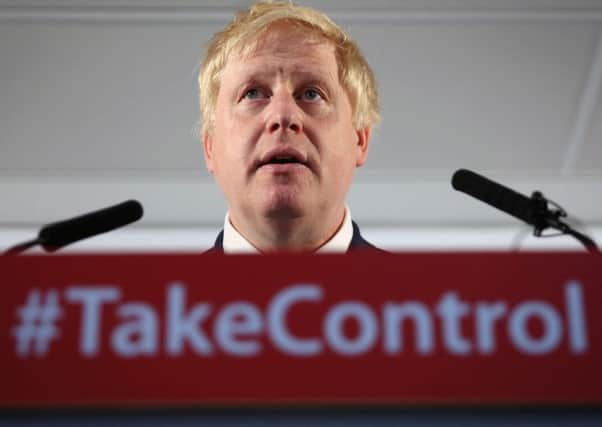Chris Marshall: Scare stories over Brexit should be ignored


While notes of caution about the SNP’s over-reliance on oil revenues to underpin its post-separation business case turned out to be well-founded, other claims about the sky falling in were often nothing short of hysterical – no wonder one Better Together wag branded the No campaign “Project Fear”.
The sobriquet has now been dusted off once more, this time by supporters of Britain’s withdrawal from the European Union to describe the stance being taken by the Prime Minister and his allies.
Advertisement
Hide AdAdvertisement
Hide AdWith little over a month left before the European Union referendum, the rhetoric on both sides is being ramped up. But David Cameron’s assertion earlier this week that Britain’s withdrawal from the EU would undermine national security and help trigger a Third World War seems particularly far-fetched.
Referring to wider European stability, the Prime Minister asked if Brexit was a “risk worth taking”. He received support from five former secretaries general of Nato – Lord Peter Carrington, Javier Solana, Lord George Robertson, Jaap De Hoop Scheffer and Anders Fogh Rasmussen – who used an open letter to describe the prospect of the UK ending its membership of the EU as “very troubling”.
And as with the independence referendum in 2014, the Americans also got involved. In a letter to the Times yesterday, 13 former US secretaries of state and defence and national security advisers warned Britain’s “place and influence” in the world would be diminished.
But just how accurate are the warnings that Britain’s security could be imperilled by a vote to leave?
The UK’s membership of the EU means access to Europol, the EU’s law enforcement agency which carries out 18,000 cross-border investigations each year.
However, there’s no suggestion that such cross-border co-operation in policing matters would end overnight after a vote to exit the EU.
Europol already works with law enforcement agencies in non-EU members such as Norway, as well as in countries as far afield as the United States and Australia. It seems unrealistic to suggest that this sort of joint working would not be extended to the UK in the event of a vote to leave the EU.
It is also unthinkable that Europe’s security agencies would not continue to work with our own to defeat the scourge of terrorism.
Advertisement
Hide AdAdvertisement
Hide AdThose inspired by the ideology of the so-called Islamic State do not respect borders when it comes to their indiscriminate killing. Britain’s continued membership or otherwise of the EU is of little or no consequence to those who seek to harm us – nor should it be for European intelligence agencies.
On the wider point of European stability, the UK will continue to be a member of Nato – the organisation which has been credited more than any other with helping to secure peace in Europe following the Second World War.
With only weeks to go before voters decide on Britain’s future in Europe, there is much to consider not only in terms of trade and economics but also in terms of identity and how we see ourselves in the world.
Scare stories about peace and stability should not enter into the equation.